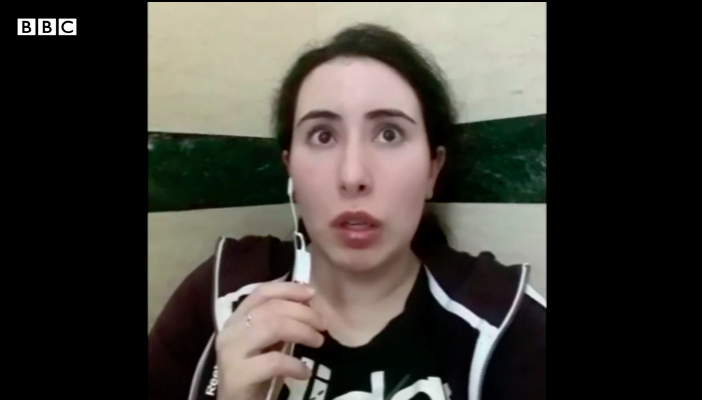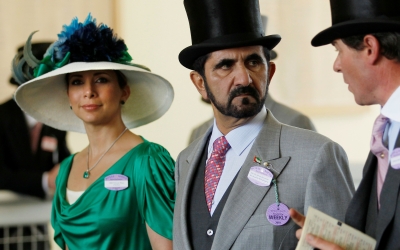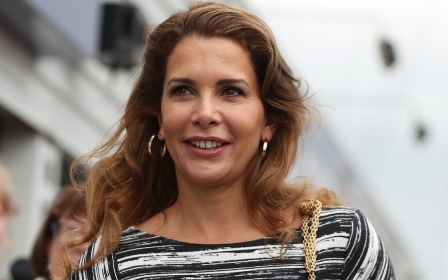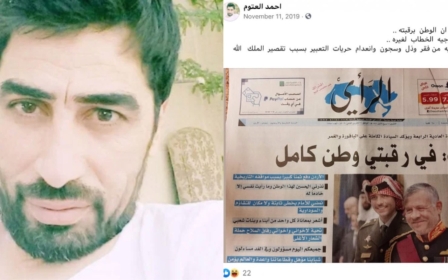UAE: Secret recordings emerge of 'hostage' Princess Latifa

Footage made public by the BBC on Tuesday showed Dubai’s Princess Latifa describing herself as a “hostage” of her father, UAE Prime Minister Sheikh Mohammed bin Rashid Al Maktoum.
In the clips, which were filmed in secret on a mobile phone, the 35-year-old princess speaks with her back to a wall in a locked bathroom: “I’m a hostage, I’m not free. I am imprisoned in this jail. My life is not in my hands.”
It is the latest development in a years-long string of headline-grabbing stories involving Dubai’s ruling family and its patriarch, Sheikh Mohammed.
In 2018, Princess Latifa escaped Dubai with the help of her friend, a Finnish capoeira instructor, Tiina Jauhiainen.
Days later, when she had got as far as India’s Malabar coast, Indian - then Emirati - forces violently boarded her boat and returned her to Dubai.
A year later, Jauhiainen was able to sneak a phone to Latifa, who has since been covertly filming herself.
“I have been here ever since, for more than a year in solitary confinement,” she says in videos shared with the BBC. “No access to medical help, no trial, no charge, nothing.”
The Dubai Royal Court claims she is safe and well, but friends say she has had little medical care and went over a year without a toothbrush.
“She hasn’t seen sunlight for months,” Jauhiainen told BBC Panorama, whose investigation found that roughly 30 police have been guarding the beachside villa where she was being held.
'She cried for a long time'
Last year, a British judge ruled that Sheikh Mohammed, the emir of Dubai, was keeping Latifa and another daughter, Shamsa, captive, and had waged a harassment campaign against his former wife, Princess Haya bint Hussein, the half-sister of King Abdullah II of Jordan.
Haya claimed her relationship with Sheikh Mohammed completely broke down in 2019, soon after she started visiting her step-daughter Latifa and asking about Shamsa.
The Jordanian princess described a visit to Latifa's locked and guarded house in December 2018: "She opened the door, looked at me, embraced me and burst into tears. She cried for a long time. She looked vulnerable."
The court heard that Shamsa, 39, temporarily escaped the family in the UK in 2000 before being recaptured, sedated and returned to the UAE; and that it was Sheikh Mohammed who organised Latifa’s kidnapping in 2018.
Latifa had previously tried to escape by driving to Oman.
Both the emir and princess are known to be friendly with Queen Elizabeth II.
Mary Robinson 'misled'
Latifa also claimed in the videos to have been tricked into taking photos with her stepmother, Princess Haya, and former UN Human Rights Commissioner Mary Robinson in December 2018.
Robinson, the former president of Ireland, who has said she met with Latifa to help Princess Haya with a “family dilemma”, was criticised for telling BBC Radio 4 after the meeting that Latifa was a "troubled young woman" who regretted fleeing from her family, and that they were taking good care of her.
“I was misled, initially by my good friend Princess Haya, because she was misled,” she told Panorama. “Haya began to explain that Latifa had quite a serious bipolar problem. And they were saying to me, in a way that was very convincing: ‘We don’t want Latifa to go through any further trauma.’
'It’s psychologically devastating. Solitary confinement of that sort is broadly considered to be a form of torture'
- Kenneth Roth, Human Rights Watch
“I didn’t know how to address somebody who was bipolar about their trauma. And I didn’t really actually want to talk to her and increase the trauma over a nice lunch.”
It is unclear if Princess Latifa is still in the beachside villa.
"This woman is imprisoned and has no permitted contact with the world," Kenneth Roth, executive director of Human Rights Watch, told the BBC. “It’s psychologically devastating. Solitary confinement of that sort is broadly considered to be a form of torture, as it becomes prolonged in the way this has.”
Tuesday’s footage is part of a BBC Panorama documentary, The Missing Princess.
“Every day I am worried about my safety,” Princess Latifa says in one video. “The police threaten me that I will never see the sun again. I am not safe here.”
This article is available in French on Middle East Eye French edition.
Middle East Eye delivers independent and unrivalled coverage and analysis of the Middle East, North Africa and beyond. To learn more about republishing this content and the associated fees, please fill out this form. More about MEE can be found here.





